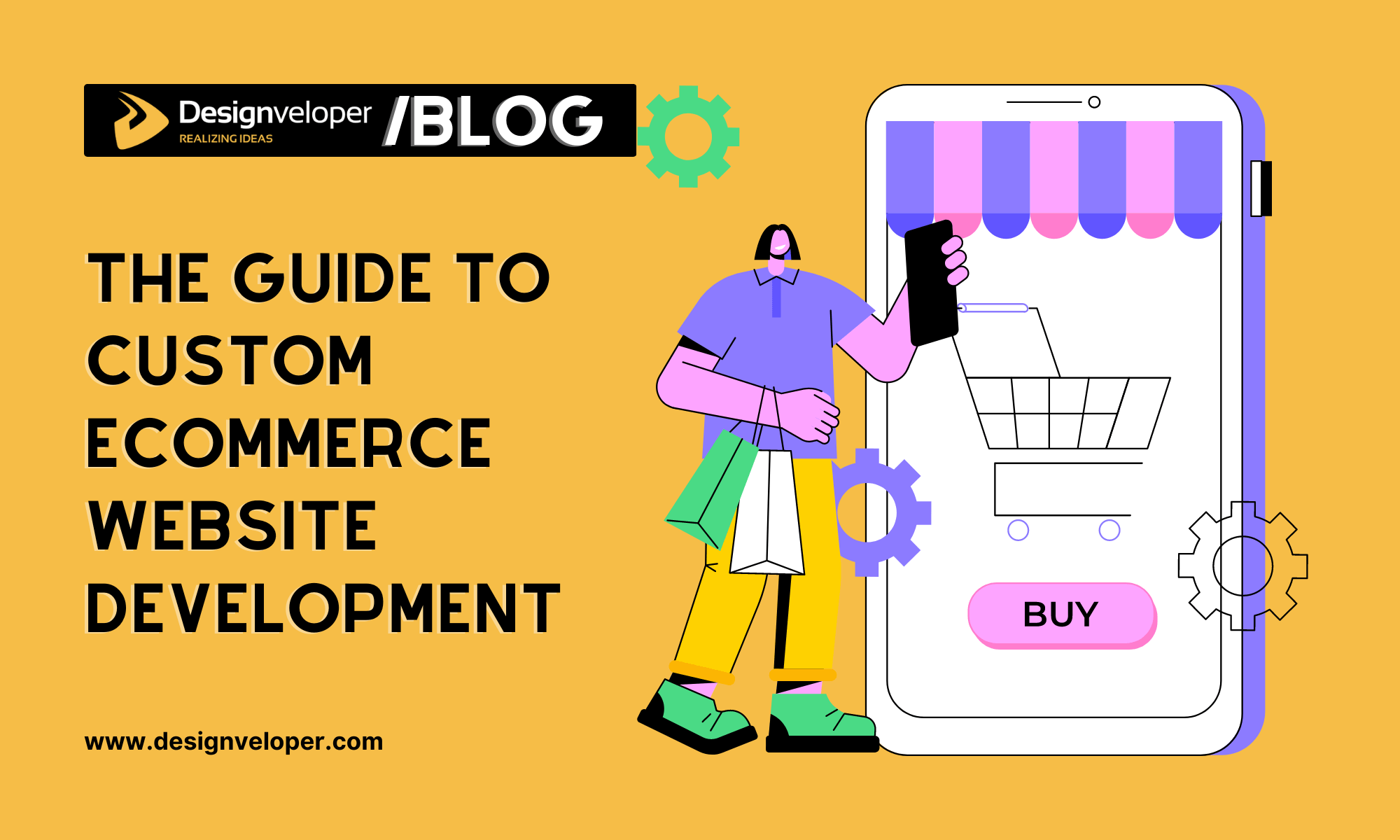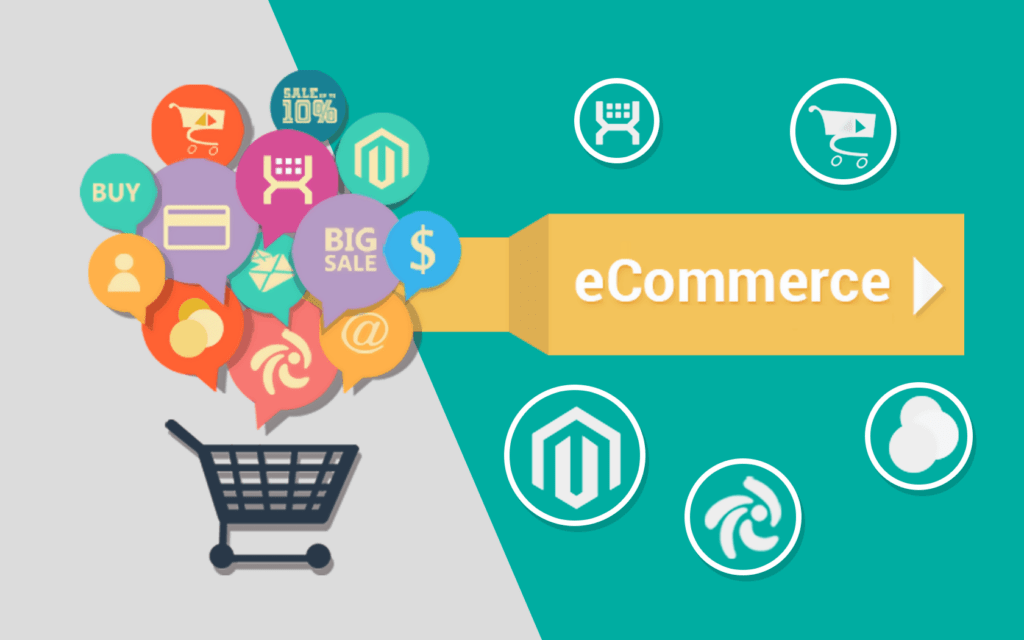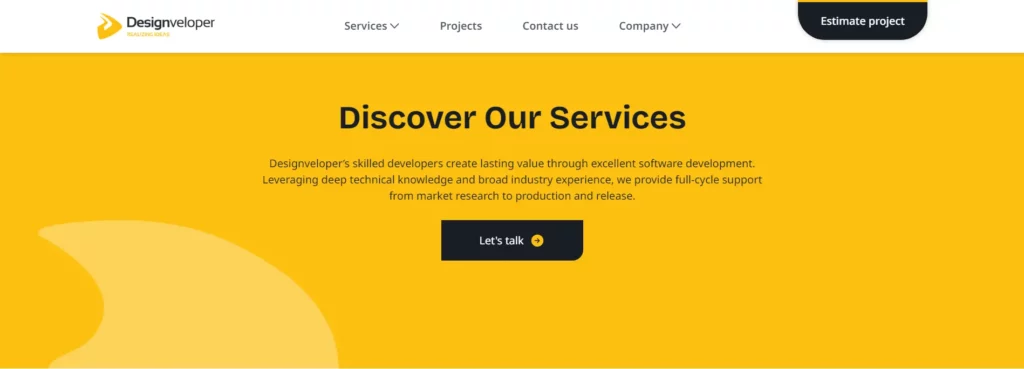7 Steps of Custom eCommerce Website Development

When it comes to web development, there are a lot of interesting trends to think about. This comes with the rise of custom eCommerce websites and online stores all over the world. If a retail company wants to go above and beyond what a standard eCommerce platform can do, it should seriously consider investing in custom eCommerce website development.
In this article, we’ll talk about why it’s good for your business to have a custom eCommerce site made. Additionally, we’ll also talk about a few important things to note before setting up an eCommerce site. In the years to come, doing business online will only become more important and valuable. If your company has been thinking about making a custom eCommerce site, now would be a good time to do so.
What Is Custom eCommerce Website Development?
Creating a custom eCommerce site is a difficult process that starts with planning and designing a unique online store for each company from scratch. It is one of the most effective ways to build an online store.
Custom web development lets you narrow your focus and make a website that does specific things. It also gives your target audience a good user experience. In general, the fact that eCommerce platforms are easy to use makes them a good option for many. On the other hand, there are some inherent benefits of building a custom eCommerce site that makes it worth it.

The Numbers
Custom eCommerce website development is a growing trend. As per recent stats, the global eCommerce market grew to $6.3 trillion in 2024. The need for custom solutions that specifically fits the requirements of a business has increased this growth.
As reported by WPBeginner, more than 43.4% (about 40 million) of all websites use WordPress. Yet, an increasing number of businesses are choosing custom eCommerce websites to get an edge over others in the ever crowded market. Better customer satisfaction and better business integration can be found using custom solutions.
For example, as Sixth City Marketing studied, 75% of consumers evaluate the credibility of a company based on the design of its website. This statistic elevates the significance of diverting funds into building a custom eCommerce website aligned with a brand’s identity.
Custom built eCommerce websites also demonstrate flexibility and scalability. As a result , these websites can adjust to changes in the market trends and requirements of the customers to have an edge for competition.
The numbers, therefore, speak for them of the merits of custom eCommerce website development. By investing in custom solutions, these businesses will expect higher customer engagement, better brand image and increased sales.
Recommended reading: 9 Necessary Elements of eCommerce Website That Boost Your Sales
5 Benefits of Custom eCommerce Website Development
An off-the-shelf eCommerce product is one that can be bought at any time and is easily accessible. This kind of product is known for being easy to use and affordable. On the other hand, it seems like most people don’t know that a generic product’s price may go up in the future. Below are some of the good things that can come from making custom software for eCommerce.
1. Customer Satisfaction
If your conversion rate is low and your bounce rate is high, you may want to think about custom eCommerce website development. Custom eCommerce websites are better able to meet the needs of their customers because they can be made to do anything.
If you choose to build a custom eCommerce site, you will be able to give your target audience members experiences that are made just for them. In the long run, this will lead to more conversions because it will make users happier, which will make them stay on the site longer and make them less likely to leave.
2. Business Integration
It’s possible that your business model and eCommerce marketing plan will need to be integrated for the eCommerce platform to work at its best. You can’t do this with a regular eCommerce platform, and you can’t do it with a product that’s already on the market.
In some cases, using an eCommerce platform might be the best way to meet all of your needs. Your development team should be able to connect your platform to your business processes, but it’s possible that the fit won’t be perfect. Custom eCommerce website development exists to solve this problem.
3. Search Engine Optimization
A custom eCommerce website can give you and your design team more power to rank higher on search engines. This can be done by giving you control over the HTML of the website, how the pages are linked, and how the metadata is set up. If you use a default or standard theme, on the other hand, you won’t be able to change a lot of important ranking factors on your site, which could hurt your SEO efforts.

Off-the-shelf eCommerce products are made for everyone, so they only have basic SEO features that aren’t made for a specific brand or business. When you use a solution that has been made for you, you will be able to meet your search engine optimization. Other unique digital marketing needs will also be available.
4. Nice Aesthetics
With the help of custom eCommerce website development, you can give your eCommerce site a unique look and feel. This is done by adding high-quality images, a great user interface, a smooth checkout process, and other features that work on desktop computers, laptops, smartphones, and other mobile devices.
Your development team will still be limited by the features of the eCommerce platform you choose to use. This is despite the fact that many of the biggest eCommerce platforms give you a lot of options for customizing. If you have a custom eCommerce site, you will have complete control over how it looks and how it works.
5. Unique Processes
Websites that handle eCommerce transactions need to fit the needs of a certain business. The eCommerce systems you use might not provide your business with the checkout and payment options it needs. With custom eCommerce website development, a way can always be found to meet your needs.
When it comes to how to check out and pay, different online businesses have different rules. It’s possible that this is because of laws and rules in their industry and/or extra steps that only their company does. In situations like this, custom eCommerce website development can be of assistance.
Recommended reading: eCommerce Infrastructure That You Should Know
Custom eCommerce Website Development: A 7-Step Guide
We’ve already talked about the idea of custom eCommerce website development, the current state of the business, and the benefits of using them. Let’s begin the process of making a custom eCommerce site, shall we?
1. Business Analysis
Before you start building an eCommerce site, you need a thorough investigation and analysis of the business sector in which you want to work. You need to know about the many different loopholes and think about who your sector’s target customers are. Find out as much as you can about their tastes, ages, and any other factors that might be important. This will help you make better product categories, descriptions, payment gateways, product photos, and other features.
Depending on whether you plan to sell other people’s products or your own, you may need to think about your pricing strategy. This consists of how to handle your expenses and other financial aspects of starting an eCommerce business. Remember to figure out what makes both your physical products and your web services stand out. Find a name that is unique and easy to remember, as well as a domain that is good for eCommerce. Look into the many ways you can set yourself apart from your competitors.
2. Choose An eCommerce Platform
During your research on your competitors, you should find a number of different eCommerce platforms. You can also use this to figure out which of these you want to change to fit your needs.
To start, you have to decide if you want to use an eCommerce website builder or if you want your development team to write the code from scratch. When you use a website builder, you usually have lower total development costs and a shorter time to market. These are the two most important advantages. But using these SaaS solutions might come with a high monthly cost. Those costs can easily add up over time, especially if you want to grow your site in the future. These costs can quickly add up to a large sum.
When you build your own eCommerce site from scratch, you have the most freedom and control. It’s easier to grow this way. Also, you won’t have to worry about getting help every time something goes wrong. But this usually makes the beginning stages of development take longer and cost more money.
3. UX/UI Design
Make a website for online shopping that is not only pretty to look at but also easy to use and full of features. Web designers with a lot of experience will be able to build a unique eCommerce site from the ground up. They can also design the best way for returning, paying customers.
It goes without saying that you need a partner with knowledge and experience in this area. It is always better to hire a single agency or company like Designveloper to develop your custom eCommerce website than to hire multiple vendors and agencies for design and development. This is because you will have consistency, no delays, few communication problems, and package pricing that will save you a lot of money.
4. Budget & Strategy
If you don’t have a good branding and content strategy, you’ll never have a large reach. Think about all the successful companies, like Amazon, and the things that helped them do well. Some of these things are their amazing logos, product descriptions, product reviews, product videos, pictures, emotional associations, and wish lists. In a similar way, it would be best for you to think about these things right now.

Also, your business plan needs to be in line with your account. This is most important when you are just starting to build your online store. To save money, it would help if you were very careful to stay within the budget and used strategies. Every time you make a decision about your money, you should go back and make changes to your budget.
5. Web Development
The part of a custom eCommerce website that customers see in their browsers is the “front-end”. Another important thing is how fast it loads for them. Keep in mind that it shouldn’t take more than 2.5 seconds to load at its fastest. If your online store takes longer than that to load, most people will leave. Because the speed at which pages load could affect how well they do in search engines, it is important to keep this speed up.
Also, when making the front-end of the app, mobile-friendliness and responsive design should be top priorities. At the moment, many customers around the world prefer to use their mobile devices, especially their smartphones.
On the other hand, a back-end is where more complex “internal” things happen. They are processing orders, adding content to the site infrastructure and updating it. It’s also about making sure it’s safe, and adding more modules. This is where the magic happens in the website’s software, making it scalable, flexible, and changeable at the same time.
6. Quality Assurance
When making a custom eCommerce website, quality assurance testing are necessary. It helps make sure that all of the website’s features work as they should. Unit testing, automated testing, and code reviews should be done regularly at all stages of the production process. It’s possible that it will require more work from the development team, but it will take much longer to fix code problems in the future, when big problems start to show up.
Usability testing is important to find out if your eCommerce website is easy for potential customers to understand and use. Before putting a custom eCommerce solution on the market for everyone, it has to go through thorough testing. In that case, you could lose both your money and the good name you had in the market before. Users today don’t like anything that isn’t working right, no matter how small the problem is.
Recommended reading: What Are Cloud eCommerce Solutions?
7. Maintenance
Think of custom eCommerce website development as more of a cycle that goes on as long as the software does. Even if your team finishes developing all of the front-end and back-end parts, you still have more work. It’s necessary to have maintenance on a regular basis to stop problems that turn off features and make sure that all computers are running the latest version.
You did it step by step, and now your custom eCommerce website is up and running, bringing in money, and making your customers happy. You should now be responsible for the support and maintenance of your website. This will keep it up and running and able to handle any problems that the internet throws at it. Connect with your customers, let them share their ideas, keep an eye on what they do, and use what you learn to plan for the future growth and improvement of your online business.
Designveloper’s Custom eCommerce Website Development Service
Since 2013, we at Designveloper have thrived in Ho Chi Minh City, Vietnam, carving a strong presence in the web and software development industry. With a team of over 90 skilled professionals—web developers, graphic designers, mobile developers, and academic teachers—we drive innovation daily. Our custom ecommerce website development service stands out among our offerings, helping businesses craft robust online stores tailored to their exact needs. This service integrates seamlessly with our broader expertise, including web app development, mobile app development, software development, cyber security consulting, AI development services, and VOIP app development. Together, these capabilities position us as your all-in-one partner for digital transformation.

Indeed, it is no longer news that custom ecommerce website development plays a crucial role in today’s market. This growth, especially in Asia, fuels online shopping and mobile commerce trends. In order to keep up with the market, businesses require a custom, top performing web site today. So we provide end to end solutions starting from planning to post launch support instead.
Our Technological Expertise and Methods
The technical skills that we can put to use on each of our projects are what we bring to the table. For the modern technologies like HTML5, CSS3, Javascript, PHP, Python, we excel particularly with React, Next.js, and Node.js. These are helpful tools that aid us to create responsive, efficient and scalable ecommerce websites that are easy to use on any device. We also emphasize mobile friendly designs as shoppers look into the online space more and more.
We use pair programming, behavior driven development (BDD) and test driven development (TDD) to ensure success. Using these approaches means projects do not go over budget or over time. We keep the communication open and are flexible with your feedback. For that reason, our methods apply perfectly to ecommerce business, which are subject to fast changing needs.
Our Success Stories and Client Praise
Our portfolio showcases our ability to deliver standout results. For example, we developed the Aha.is ecommerce platform for Netgengið ehf., founded in 2011, to boost Iceland’s local economy. This project highlights how we create user-friendly, efficient online stores that drive engagement and sales. Family-owned businesses trust us to expand their digital reach with tailored solutions.
Our clients also vouch for our excellence. Thibault, CEO at Joyn’it, calls us a “perfect service and trusted partner” for ambitious projects and long-term relationships. Their words reflect our commitment to reliability and satisfaction. When you invest in our custom ecommerce website development, we prioritize your success every step of the way.
Our Edge in a Competitive Market
We operate in a bustling ecommerce landscape, with over 28 million stores worldwide. Our location in Vietnam gives us a unique advantage. Recognized as a cost-effective outsourcing hub with strong work ethics, we offer top-quality services at competitive rates. This appeals to international clients seeking smart budget solutions.
Moreover, we fill a vital market gap with our focus on customization. Without a custom website, businesses risk losing millions of buyers. We meet this demand with precision. Our technical expertise and agile approach make us a top pick for companies aiming to excel online.
Conclusion
We hope that this article has given you a better idea of how to set up a website for online retail sales in a methodical way. Because the world of eCommerce is so full of little details and complexities, it may be hard to follow this tutorial at times. If you don’t pay attention to even the smallest details, they can have a big effect.
If you find that you need more information and help, you should think about asking Designveloper for help. Because we have a lot of experience building custom eCommerce websites, we can help you build an awesome online store from the ground up.

















































